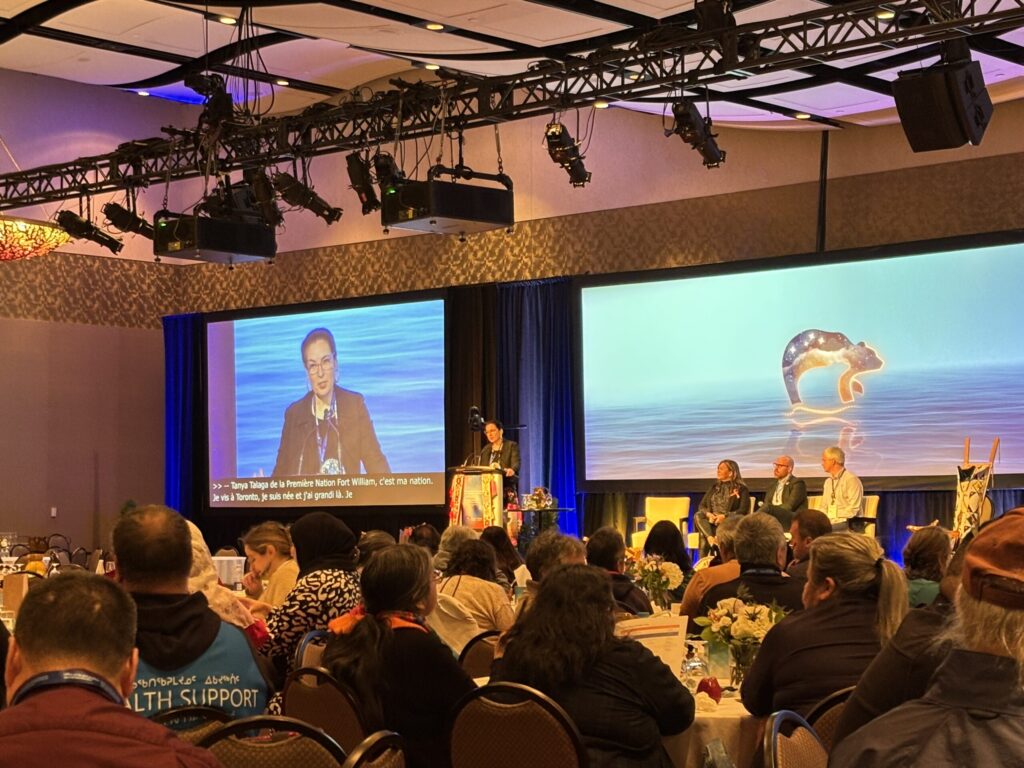An opinion piece posted with permission from author Tanya Talaga.
Orginally published by the Globe & Mail on April 10, 2025.
Carney and Poilievre are both falling short on Indigenous issues
By Tanya Talaga
During this crucial federal election, Canada has the chance to reinvent itself, strengthen our chosen identity and drill down on what truly makes Canada different from not just the U.S., but, the rest of the world. Question is: have we decided on what that Canada looks like?
If polls are giving us an accurate viewpoint, this election is essentially between a strait-laced central banker in Liberal Leader Mark Carney, whose father was once the principal of an Indian day school in Fort Smith, N.W.T., or a Conservative career politician whose idol is Sir John A. Macdonald and who voted against the United Nations Declaration on the Rights of Indigenous Peoples. We’ve all but thrown out the only progressive in this election campaign, the New Democratic Party’s Jagmeet Singh, a lawyer who just can’t seem to get noticed.
If this translates into fewer than double-digit seats in the House, who’ll be the sober social conscience?
Mr. Carney found himself in an uncomfortable position last week, when at a campaign stop in Oakville, Ont., he was asked to respond to a news report about his father calling “Native” children from the Northwest Territories “culturally retarded” during a 1965 radio interview.
He said, “I love my father, but I don’t share those views, to be absolutely clear.” Canada is a relatively small place; it is not surprising that some Canadians had family members who worked for Indian residential schools and day schools or at Indian hospitals. Further, for decades, many Anglican Church congregations raised money every Sunday to send Indigenous children to these so-called schools.
To his credit, Mr. Carney addressed the issue of his father being a denialist – someone who minimizes and misrepresents the harms of residential schools – head-on, saying he does not share his views. But he needs to go further. What are his views, and those of the 2025 Liberal Party?
So far, the Liberals have been light on policies that directly concern Indigenous people beyond economic resilience and their overarching belief in reconciliation. The Conservatives have been light on specifics, too. Both parties can’t seem to talk about Indigenous people unless it is about critical mineral extraction, investments and promises of consultations. And both parties have just this last election week, released their platforms.
That is unfortunate, as there is a lot to talk about. We’ve seen a wildly divisive $48-billion child welfare agreement fall apart, with Ontario now going on its own with a negotiated $8.5-billion deal that other regions argue is unfair as they say they’ve been left in limbo after the majority of the Assembly of First Nations chiefs rejected the agreement. Will the Liberals open negotiations again, to the other regions or try to figure this out?
Remember, the health and well-being of thousands of First Nations children is at risk here. And if you tell me that this cannot happen due to the legalities of the situation, I’d challenge you to get back to the table. There is always room to talk it out.
The Conservatives have a strange way of courting the Indigenous vote. In a campaign ad, Mr. Poilievre talks to a bust of Sir John A. Macdonald, speaks of the greatness of the railway and promises to involve First Nations leadership in building pipelines, getting First Nations approval before anything else.
But he does himself or his party no favours when he ignores the concerns of First Nations leaders in British Columbia, by allowing Aaron Gunn to run in North Island-Powell River. Mr. Gunn tweeted in late 2022 that, “There was no genocide. Stop lying to people and read a book.” Mr. Poilievre stands by his candidate, saying that Mr. Gunn denying the consequences of residential schools is “just misinformation” and that Mr. Gunn wants to continue to condemn the residential schools.
It would be a strong move for both party leaders to come out and support Winnipeg Centre NDP MP Leah Gazan’s call to make residential school denialism a hate crime. And if they don’t like the idea of supporting Ms. Gazan’s idea – they can come up with their own. If either party had the moral courage to do this, they would get rid of the murkiness surrounding their parties’ commitments concerning the harms of denying a genocide.
It would go a long way toward relationship-building and honouring the thousands of survivors and intergenerational survivors by the two men leading the frontrunning parties. It would be a needed reset. For them and us.
This would give Canada’s relationship with Indigenous people a needed boost – one that goes beyond money, one that speaks to Canada’s heart and to what the nation truly wants to be. One that shows all children that there is no room for hate, only inclusion.
